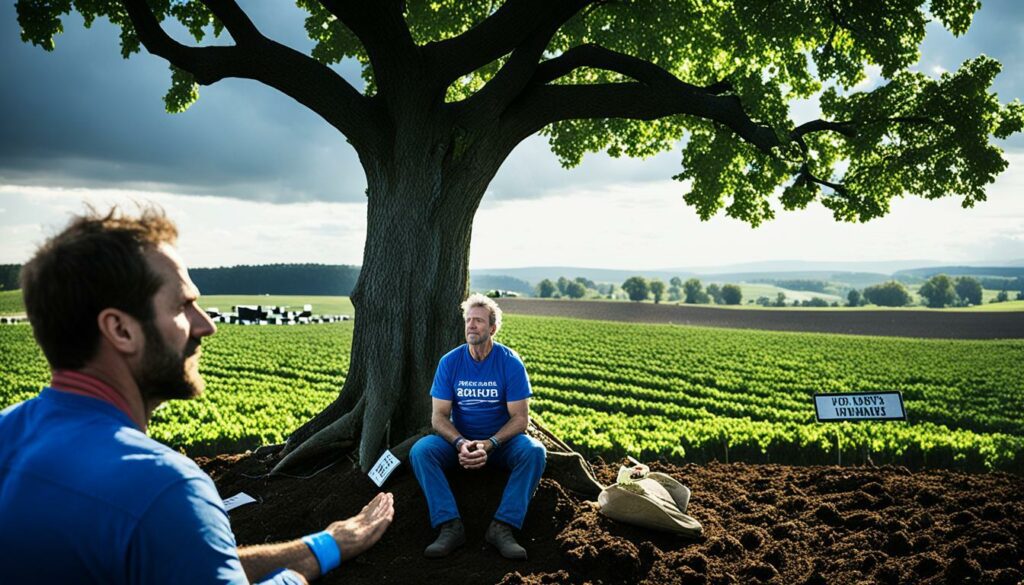Menu

In 2016, the suicide rate for male farmers and ranchers was 43.2 per 100,000. This was much higher than the 27.4 per 100,000 rate for male workers in all jobs. This shows a major mental health problem in farming areas. Mental health days are crucial for farmers. They can be life-saving.
Farming brings a lot of stress. There’s the uncertainty of making money, the weather is always changing, and it’s often a lonely job. Because getting help is hard in rural places, raising mental health awareness and support there is key.
Farmers’ stress levels often lead them to heart disease and high blood pressure more than others. That’s why having mental health days is so important. It helps farmers deal with their stress, offering essential relief and coping strategies. This can really make a difference in their lives, leading to a healthier and happier farming community.
Farmers in the United States deal with a lot when it comes to their mental health. They’re hit hard by money worries, being far from others, and relying on the weather. These things make their lives tough. That’s why it’s vital to support their mental well-being in a big way.
The ups and downs of the economy really stress farmers out. With prices changing, extreme weather, and big farm debts, life isn’t easy. These challenges often end in high stress and anxiety. They even face more risk of suicide than other jobs. It’s clear that looking after their mental health means dealing with the financial side too.
Living far from others is tough for farmers. They may not get the healthcare or mental help they need. This can make them feel more alone and more sad. In 2016, the suicide rate for male farmers was much higher than for others. These factors paint a bleak picture. It shows that being isolated in rural areas is a big mental health risk.
The weather can make or break a farmer’s year, both financially and emotionally. They worry a lot about whether their crops will survive. The ever-present threat of disasters only adds to the stress. Often, farmers just can’t control these things. This kind of stress can even lead to dangerous health problems like heart issues and high blood pressure.
| Challenge | Impact on Mental Health | Key Statistic |
|---|---|---|
| Economic Stressors | Increased anxiety and depression | 100% of farm couples experiencing financial problems and health complaints |
| Rural Isolation | Higher prevalence of mental illness | 43.2 per 100,000 male suicide rate among farmers in 2016 |
| Weather Dependency | Heightened stress and risk of suicide | High rates of death from stress-related conditions like heart disease and hypertension among farmers |
Mental health days are becoming more recognised, especially in tough jobs like farming. They give people a break to look after their mind. This helps in dealing with daily pressures. For farmers, these days off are very important. They keep both body and mind healthy so they can work well and for the long term.

Think of mental health days as time off to relax and care for your mind. It’s not just any day off you might take for being sick or going on holiday. These days are particularly for managing the stress of work. This is especially key for farmers. Farming can be extremely stressful with its ups and downs, hard work, and being often alone. Mental health days are a lifeline for farmers to recover and stay well.
There are many plusses to taking mental health days, especially for those in farming. They help in dealing with stress by giving a pause and time for self-care. They also prevent burnout, which is a real danger for farmers. A break now and then can lift mood, lower anxiety, and give a feeling of control. This all helps farmers work better, live healthier, and be more productive.
To get the most out of your mental health day, planning is key. Here’s how:
Fully adding mental health days into their schedule helps farmers work more sustainably. It protects their mental health in the long run.
The suicide rates in agriculture are sadly much higher than in other jobs. In 2016, male farmers and ranchers had a suicide rate of 43.2 per 100,000. This is more than the 27.4 figure for all working-aged men. It shows a serious problem with mental health in the farming world.
Farming is a tough job, leading to high stress levels. Things like bad weather, expensive materials, and financial risks all play a part. Plus, using pesticides can make things worse, leading to more severe mental health issues. Rural isolation makes getting help harder, with fewer mental health support services available outside of cities. As a result, mental illness is common in the countryside, making it even more dangerous for farmers.
A study in 2018 found that farm workers and owners have a higher risk of suicide. This highlights the mental health crisis in farming. Anxiety and depression are also common among farmers. They might not seek help due to the idea that mental health issues are not ‘macho’. This causes a lot of harm to their mental well-being.
There are ways to help. Mental health education and programs where farmers support each other can make a big difference. By spreading information and making help easier to find, we can lower these high suicide rates. We must support our farming communities.
It is imperative that we take immediate action to support the mental health of farmers, addressing the unique challenges they face and offering concrete solutions to prevent further tragedies.
We need to work together to help farmers. Their families, advisors, and local support are key in making services that specifically help farmers. Let’s create a safe space for farmers, understanding how important their mental health is for them and their work.
Farmers need to know they have places to call for help with their mental health. This is especially true with the mental health problems in farming areas going up. Knowing and using these hotlines and resources could save a life.
The Farm Aid Hotline is there to help with farmer mental health issues, Monday to Friday. They offer support for things like financial worries or personal problems. Farm Aid is focused on helping farmers deal with their specific challenges.
The 988 Suicide and Crisis Lifeline provides help day and night, for free. It’s a key tool for anyone feeling extremely down or having suicidal thoughts. It ensures rural people have someone to talk to when times are really tough.
The 2-1-1 hotline is always ready to connect people with local mental health resources. It helps with a wide range of issues such as health care and family support. This support is crucial for farmers and their families needing help fast.
The mental health of farmers in the United States is getting more attention. The tough times they face are now very clear. Issues like low prices for products, natural disasters, high farm debt, lack of workers, and trade troubles hit them hard. Because of these challenges, farmers’ mental health is at risk. The number of suicides among farmers is a serious concern. So, there’s a big push for better mental health support for them.
Farm Aid has been key in helping farmers with mental health problems. This group helps farmers who are in crisis. They have a hotline for urgent calls and programs to link farmers with local mental health help. Farm Aid also works to break the silence on mental health in farming. They make sure farmers know it’s okay to get help and that they’re not alone.
The American Farm Bureau Federation leads the Farm State of Mind campaign. This initiative talks about the mental health struggles farmers face. It not only raises awareness but also points out ways to get help. The campaign encourages talking about mental health openly. Its goal is to make farming communities healthier and lower the number of farmer suicides.
Here’s a table that shows some big investments in mental health:
| Organisation | Investment | Purpose |
|---|---|---|
| Georgia DBHDD | $2 million | Address rural mental health crisis |
| Georgia Department of Agriculture | $500,000 | Mental health resources and awareness |
| UGA Cooperative Extension | $460,000 | Educational opportunities focused on farmer stress |
| UGA Cooperative Extension | $2.2 million | Behavioral health and rural stress work |
Farm Aid and the Farm State of Mind campaign join forces to help farmers. They aim to provide immediate help and fight the stigma around mental health. Together, they make a big difference in supporting farmers’ mental health and well-being.
Farmers and those in agriculture deal with heavy economic stressors. These have a big impact on their mental health. Challenges like market changes and trade tensions often make them feel stressed and worried. For example, in 2016, the suicide rate among male farmers and ranchers was much higher than other jobs – 43.2 per 100,000, compared to 27.4.

Disturbed by financial uncertainties, farmers and their families lose their peace and well-being. Add natural disasters, and the financial stress worsens. Suicide rates among farmers have been 3.5 times higher than the national average in 2019. This is a concerning sign of bad mental health.
More deaths from stress-related illnesses like heart disease happen in agricultural work. Farm workers also face more mental health issues like depression and anxiety. These factors bring both mental troubles and physical health problems. So, it affects all parts of a farmer’s life, not just their thoughts.
In 2021, over half of rural adults and more than 60% of farmers felt more stress and mental strains. The loneliness of farm life, alongside long hours, worsens mental health. Studies reveal that farmers and ranchers have been more prone to suicide from 1992 to 2010 than others.
It’s crucial to look at how economic stressors and mental health connect in agriculture. Giving farmers mental health services and financial advice can help. It also reduces the shame around getting help. As people learn more, good mental health support must become easy for farmers to access. This is vital while they face ongoing financial insecurity.
Farmers and ranchers often feel alone and deal with tough jobs, which can lead to mental health problems. It’s key to pick up on mental health symptoms early. This way, we can step in to help and stop things getting worse.
It’s important to know the signs of stress and worry to help farmers. These signs might be:
Finding depression signs in farmers early can save lives. Look out for these clues:
If a farmer talks about suicide or says they’re a problem, they need help fast. Signs to watch for include:
| Population Group | Suicide Rate per 100,000 (2016) |
|---|---|
| Farmers and Ranchers (Male) | 43.2 |
| Male Working-Aged Adults across All Occupations | 27.4 |
Studies show farmers and ranchers are more likely to die by suicide than those in other jobs. They also have a higher risk of mental illness. This includes stress, depression, anxiety, and thoughts of suicide.
For more on mental health help in rural areas, go to Rural Health Information Hub.
Addressing mental health in farming matters. It’s vital for those working the land to feel okay about reaching out for help. Rural areas see more mental illness than cities, making it hard for farmers to cope. In fact, in 2016, male farmers and ranchers were more at risk of suicide than men in other jobs.
Stress-related illnesses like heart disease are high in farming. Yet, discussing mental health can be challenging because of a ‘tough guy’ culture in farming. Encouraging farmers to talk and seek help is key.
“Three-quarters of farmers surveyed experienced moderate or high perceived stress, and thoughts of suicide were found to be twice as high among farmers compared to the general population.”

Climate change brings more challenges for farmers like floods and droughts. It’s also been shown that things like economic struggles and feeling isolated can lead to suicide. So, it’s important for farmers to have access to mental health support.
To help, we should support farmers in discussing their mental health. Breaking the stigma can make a big difference in how willing they are to seek help. This supports not just the farmers but the future of our food.
| Occupation | Suicide Rate (per 100,000) | Common Stressors |
|---|---|---|
| Farmers and Ranchers | 43.2 | Economic Uncertainty, Isolation, Weather Dependency |
| All Male Working-Aged Adults | 27.4 | General Workplace Stress |
Supporting farmer mental health and reducing stigma makes our farming community stronger. It’s on all of us to make sure they have what they need to be well, in body and mind.
It’s crucial to have easy-to-reach mental health care in the countryside. Farming life brings particular stresses. For example, male farmers and ranchers are more likely to take their own lives. The rate was 43.2 out of 100,000 in 2016. This is higher than the rate for male working adults in all jobs, which was 27.4.
Studies show that those who work on farms face more mental health issues. These can lead to stress, feeling down, and worry. Signs include being easily annoyed, headaches, and not sleeping well. This can even lead to heart problems and diabetes.
But, things are looking up. Many farmers are now more open to getting help for mental health. In December 2021, 61% said they didn’t feel that talking about mental health was bad. This is better than the 72% who felt this way in December 2020.
Most farmers now feel okay talking about mental health with family and friends. This is a big step towards better mental health care in the farming world.
Groups like AgWell in Colorado, New Mexico, and Wyoming are doing good work. They offer mental health workshops and training with help from a USDA grant. This is key to help farmers learn to manage stress better.
A detailed plan for mental health care is essential for helping farmers. Services like the Colorado Agricultural Addiction and Mental Health Program are doing great work. The program gives farmers and ranchers six free therapy sessions. This is very important in places focused on farming.
We must keep working to make mental health care easier to get in rural areas. By improving services, we can give farmers better tools and help. This will help fight the mental health issues that are serious in the farming world.
Farmers and ranchers face unique challenges that greatly affect their mental health. In 2016, the male suicide rate in this community was 43.2 per 100,000, much higher than the average for all jobs. This shows the urgent need for mental health crisis intervention in farming.

Agriculture workers are more likely to suffer from depression and anxiety. They are affected by things like money troubles, natural disasters, and feeling isolated. Mental health issues are more common in the countryside than in cities, making it a big problem.
Getting mental health help in rural areas is tough because there are fewer services. NY FarmNet helped over 6,000 people in New York last year. They had 755 cases open and helped 325 new people in just one day. Such groups are vital.
Support from the agricultural community is essential. The Farm and Ranch Stress Assistance Network got $28.7 million to fund mental health care for three more years. This is a step in the right direction.
Programmes like the University of Maryland Extension’s help train mental health workers to support farmers. Helping farm workers deal with stress and suicide risk is crucial. This type of help can make a real difference.
To combat the crisis, we need to work together. Making more resources available quickly is key. By being proactive and improving the support system, we can help protect farming communities’ mental health.
Community support is key in helping farmers deal with mental health issues. It goes beyond giving comfort. It helps in creating a space where farmers feel they belong and are valued. This cuts down on feelings of depression, anxiety, and stress which are common among them.
Gatherings and support groups are crucial for many farmers. Here, they can share their difficulties with others who understand. Research shows that such support can lower stress and better mental health. It creates a strong feeling of support, boosting spirits and resilience.
Creating and supporting these networks in rural places is vital. It fights off loneliness and despair in farming communities. It connects farmers who can share advice and understand each other’s struggles. Local support groups or meetings offer places for open conversation.
But, these networks do more than help individuals. They strengthen a culture of working together for everyone’s benefit. This teamwork can address issues like financial struggles and bad weather that can affect mental health.
In short, community support and strong rural networks greatly improve farmers’ mental health and quality of life. By sharing and helping each other, farmers can face their problems with more confidence and hope.
The link between financial stability and mental health is key, especially for farmers. Their incomes can easily be impacted by things outside their control. For example, in 2016, the U.S. saw a high male suicide rate among farmers and ranchers.
This rate was at 43.2 per 100,000, much higher than the 27.4 among male workers in general. It shows how crucial financial stability is for mental well-being.

Mental illness is more common in rural places. A 2017 study found that lack of mental health providers there makes the issue worse. Farmers, often working alone, also find it harder to cope.
So, keeping their finances in good shape is vital for their mental health.
The National Farmers Union highlighted the mental health risks for people in farming. Things like stress, depression, and anxiety are more likely. Unfortunately, suicide rates are higher, too.
Good financial health can help reduce these mental health challenges. It takes off a lot of pressure for farmers.
The crisis is severe, as shown in a 2018 study in the Journal of Rural Health. Farmers and farm workers have a higher risk of suicide than many other jobs. This proves the strong link between being financially stable and having good mental health.
Clearly, financial stability is closely tied to mental health. By making sure farmers are financially secure, we can help improve their mental health. This can significantly enhance their lives.
Mental health is a big issue in rural areas because the farming community faces unique challenges. Institutions like North Dakota State University Extension and University of Minnesota Extension help by providing support. They offer help with stress management and mental health. Farmers, ranchers, and their families find these resources very useful. They help deal with the pressures of living in the countryside.
The North Dakota State University Extension works hard to help with rural stress. They have workshops, webinars, and counselling to reduce stress and improve mental health. Agri-workers learn to cope better and can connect with support networks because of these services. The extension is deeply committed to helping people in rural areas deal with stress.
The University of Minnesota Extension also supports those in rural areas with stress. They offer various services, like teaching stress reduction and mental health training. They also provide counselling. Since mental health problems happen more in the countryside than in cities, they focus on giving practical help and making services easy to use.
These two universities are key in fighting the mental health crisis in farming communities. They provide the help needed, specifically for farmers and ranchers. Through their stress management programs, people in agriculture can learn how to cope with stress. This helps make their mental health better.
Mental health days let farmers take a break from their daily tasks. They get to focus on feeling better. These days reduce stress and prevent burnout.
Farming has its own set of challenges. These include dealing with money worries and being far from others. The need for mental health help is great in this community.
Uncertain money situations can be very stressful for farmers. Factors like prices changing and debts can make them anxious. This affects how they feel overall.
Having mental health days lets farmers step back from work. They can do things they enjoy, like hobbies or being with family. This break boosts their health and energy.
To make the most of a mental health day, it’s important to forget about work. Farmers should focus on looking after themselves. This can mean spending time on personal hobbies or just relaxing.
Farming comes with many pressures. These include money problems and being alone. The stressful nature of the job makes mental health help very important.
Several helplines are there to support farmers right away. They include the Farm Aid Hotline and the 988 Suicide and Crisis Lifeline. Connecting with these can lead to finding local help.
Farm Aid and the American Farm Bureau Federation have launched special efforts. These aim to improve mental health, raise awareness, and fight against stigma in the farming community.
The ups and downs of the market and natural issues can be tough on farmers. This can lead to long-term stress, anxiety, and depression. It greatly impacts their mental health.
Signs include being quick to get annoyed, having frequent headaches, and worrying all the time. Knowing these symptoms can help spot when help is needed.
Watch out for times when they’re unusually sad or have lost interest in usual things. Changes in eating and sleep, and feelings of hopelessness, are also signs. Addressing these quickly can make a big difference.
Stopping the stigma involves informing and talking openly about mental health. This push for more conversations helps build a more supportive climate. Farmers are then more likely to seek needed help.
Countryside places often lack medical services. Making sure mental health help is easy to get strengthens the support for farmers. This is vital for their health.
Offering support, improving resource availability, and ensuring farmers can get help are essential. United efforts from communities and the government are very important.
Being part of a supportive community can make a big difference. It gives farmers a sense of being understood and offers practical help. This kind of support improves their mental strength.
Having stable finances means less worry and more peace of mind. This is key to good mental health for farmers. It helps them manage stress well.
Institutions like North Dakota State University and the University of Minnesota have programmes to handle stress in farming. They offer specific help and strategies for farmers’ unique challenges.